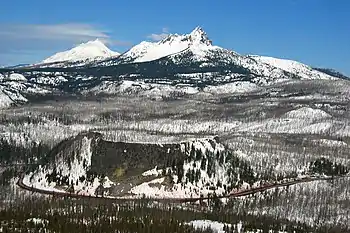Santiam Pass
Santiam Pass is a 4,817-foot (1,468 m) mountain pass in the Cascade Range in central Oregon in the United States. It is located on the border between Linn and Jefferson counties, about 18 mi (29 km) northwest of Sisters, between the prominent volcanic horns of Three Fingered Jack to the north and Mount Washington to the south. Several other smaller volcanoes, including cinder cones and tuyas, are found near the summit of the pass. U.S. Route 20 connects eastern Oregon with the valley of the Santiam River on the west via Santiam Pass. One of the 19 or 20 lakes by the name of Lost Lake is located beside the highway just west of Santiam Pass. The pass may be approached from the west by three distinct routes:
- Oregon Route 22, also known as the North Santiam Highway, proceeds southeast from Salem and follows the North Santiam River to Santiam Junction.
- U.S. Route 20, which follows the South Santiam River from the Albany–Corvallis area to Santiam Junction.
- Oregon Route 126, which follows the McKenzie River northeast from Eugene.
| Santiam Pass | |
|---|---|
 | |
| Elevation | 4,817 ft (1,468 m) |
| Traversed by | |
| Location | Jefferson – Linn counties, Oregon, United States |
| Range | Cascades |
| Coordinates | 44°23.3′N 121°50.7′W |
From the east, Santiam Pass is approached from the town of Sisters; however, immediately east of Sisters, U. S. Highway 20 and Oregon Route 126, which share the route over the pass, split with Oregon Route 126 going northeast to Redmond and Prineville, Oregon and U. S. Route 20 heading southeast to Bend.
History
While the pass was known by native peoples, the first recorded crossing of the pass was in April 1859 by an expedition searching for a cattle trail over the Cascade Range from the Willamette Valley to Central Oregon. This expedition was led by Andrew Wiley, who reportedly climbed a tall tree on a mountain near Lost Prairie to help determine the route. Lost Prairie is located along Hackleman Creek between Fish Lake and Tombstone Prairie.[1] Wiley later helped establish the Santiam Wagon Road.
Originally known as Hogg Pass, after Col. T. Egenton Hogg who designated this crossing for his proposed railroad, Santiam Pass was renamed in 1929 when the Santiam Highway was completed. The original Santiam Pass is located three miles south and was discovered in 1859.[2]
Nearby volcanoes
See also
- McKenzie Pass – Santiam Pass Scenic Byway
- Santiam Junction State Airport, located west of the pass along U.S. Route 20
References
- McArthur, Lewis A.; Lewis L. McArthur (1984) [1928]. Oregon Geographic Names (6th ed.). Portland, Oregon: Oregon Historical Society Press. p. 515. ISBN 0-87595-237-2.
- "Gerald W. Williams Regional Albums, 1875-2000". scarc.library.oregonstate.edu. Retrieved 2017-04-28.
 This article contains quotations from this source, which is available under the Creative Commons Attribution 4.0 International (CC BY 4.0) license.
This article contains quotations from this source, which is available under the Creative Commons Attribution 4.0 International (CC BY 4.0) license.